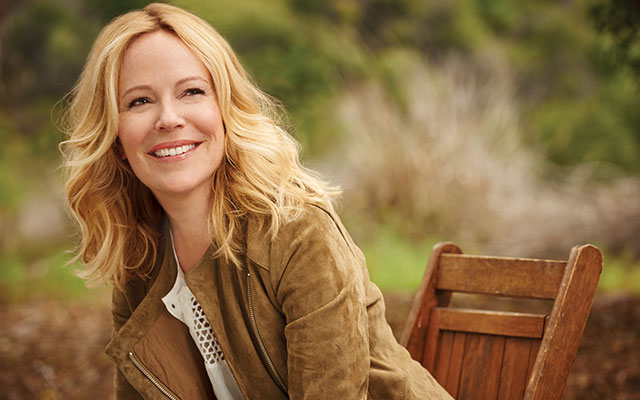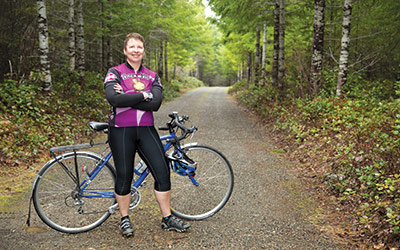Dani Shapiro has always tackled life’s most substantive and ineffable subjects — love, death, spirituality, and authenticity — by writing her heart out. Each of her five novels and three memoirs, including her most recent works, Still Writing and Devotion, has been a direct response to some deep, personal soul-searching.
“It comes as a surprise to me that not everybody thinks about these things, because we can’t escape them,” Shapiro says. “We can choose not to think about them, but at some point, they are going to emerge.”
When she’s in the “uncomfortable space” between books, the introverted Shapiro shares her insights by teaching writing workshops around the world and leading yoga and meditation classes.
She hasn’t shied away from delivering her message to larger audiences, either: In the past few years, she’s appeared as a guest on Oprah’s Super Soul Sunday and as a speaker at the Huffington Post’s Thrive conference in New York City.
Ironically, delving into heavy topics is Shapiro’s way of discovering what she — like so many of us — craves most: lightness.
What most interests her, she says, is not so much musing about loss and grief. It’s accessing a particular “lightness of being” that comes with finding ourselves OK as we are, wherever we are, right now.
“More than anything,” says Shapiro, “my desire is to be in the present moment — not to be continually onto the next thing or in the past. Because one thing that happens when we’re present is that the moment expands.”
Experience Life | Why do you think having a creative practice is essential to living a meaningful life?
Dani Shapiro | A practice that involves creative expression — whether it’s writing, painting, or cooking — brings us closer to ourselves and also connects us more deeply with the world and the reality around us.
It’s the truth that “The unexamined life is not worth living.” When we attempt to create something, we’re attempting to examine something about life itself or about our own humanity, and that brings us into a deeper connection with what it means to be alive.
EL | In your book Devotion, you share a lot about your own spiritual journey. What inspired you to go there?
DS | Devotion was about entering midlife, and early in the writing I discovered a Carl Jung quote that stopped me in my tracks: “Thoroughly unprepared, we take the step into the afternoon of life.” When I read that, I was like, Whoa, I’m taking that step whether I’m ready or not.
It’s really useful to think about the ways that different experiences in our lives require different kinds of practices and different sets of tools.
For example, I grew up Jewish, and even though I hadn’t remained observant as a Jew, I felt steeped in my own background and culture of being Jewish. But I also always felt there was wisdom in many different faiths and from many different thinkers that I hadn’t been exposed to before. I wanted to explore the idea of building a spiritual life rather than simply going with what had been handed to me. I wanted to figure out what spirituality and faith meant for me.
EL | Which texts or practices became important to you during that journey — and why?
DS | When I started writing Devotion, I realized I already owned a lot of the books I wanted to read — I just hadn’t cracked them. I owned three or four copies of Abraham Joshua Heschel’s The Sabbath. They had been given to me as gifts, and I must have picked up a copy myself, but if you’d asked me if I owned that book, I would have said no.
Heschel’s ideas became very important to me. He talked about the Sabbath as “a cathedral of time” in a way that I found so gorgeous. Time itself is a cathedral. You don’t need four walls surrounding you. Any place can be sacred.
Trappist monk Thomas Merton is also important to me because he had an impassioned dialogue with God. It was a one-way dialogue, but he definitely felt like he was speaking to somebody who was listening and who was speaking back. Merton was propelled by doubt, which was another radical thought for me.
I thought that if you had faith, you didn’t have doubt. And I had a lot of trouble with that, because I had a lot of doubt, and that made me feel like I didn’t have faith. Again and again, the thinkers I gravitated toward were the ones who really spoke and wrote of doubt being an element of faith.
EL | You’ve also written about how your yoga practice has changed over the years. Please touch on that.
DS | I’ve practiced yoga since 1990, but I didn’t connect to the spiritual aspects of it that powerfully until 2002, when my husband and I moved from New York City to rural Connecticut. Moving to the country took me off that conveyor belt where you open the door and get swept up by the steady stream of humanity all around you.
Suddenly I wasn’t living in a city where yoga studios were on every corner and all you needed to do was sign up for the 4:45 class, unroll your mat, and do yoga.
This forced me to develop my own practice. If I wanted it, I had to build it for myself. I had to unroll my own mat, put on my own music, light my own candle. That’s when yoga became a more spiritual practice for me because I was no longer being propelled by it; it was being propelled from me.
EL | You’ve said that, as we get older, we get hungrier for moments of authentic connection. How can we create more of those?
DS | If time is our cathedral — if it’s our most precious resource — then I don’t want to squander it. I want to spend my time with people with whom there’s the possibility of developing an authentic connection.
Of course, we all have jobs and responsibilities and must spend time with people in various situations where a deep connection may not be possible or even appropriate. But, in the time that is truly ours, I think we need a kind of personal litmus test for who we want to spend time with.
Mine is “Can we really know each other, can we really listen to each other, can we really understand and really see each other?”
EL | What writing assignment would you give people who are interested in doing some creative self-exploration?
DS | One of my favorite go-to writing exercises — because it gets pens moving across the page — simply asks people to complete a series of single sentences that all begin with “I remember. . . .”
Those two words are among the most evocative in the English language. How can you not finish that sentence?
The exercise isn’t about creating a story or answering chronologically, because the way we remember things is not narrative or chronological — it’s all over the place. But often, your responses to that phrase will be illuminating.
Just write “I remember” and then finish the line. Drop down to the next line, do it again, and keep going. You will surprise yourself with what you learn.
Photography by Kwaku Alston




This Post Has 0 Comments